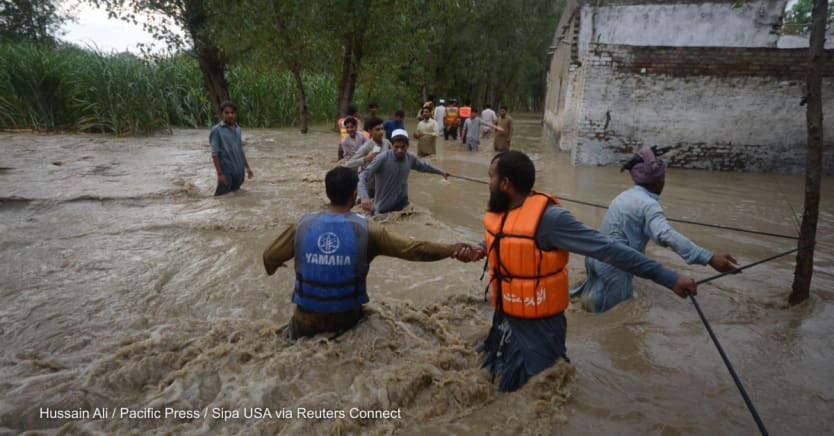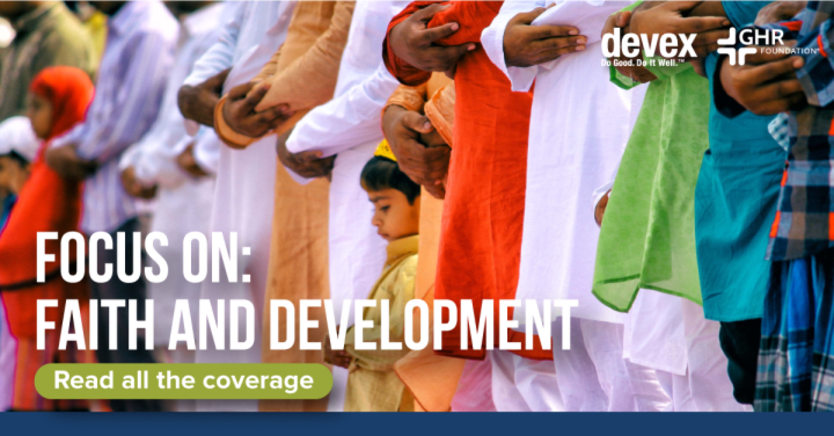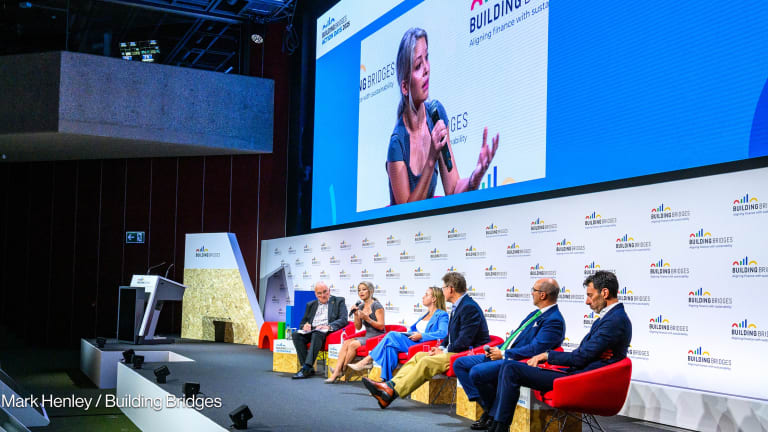
Islamic NGOs in the United Kingdom say their finances are being unfairly targeted by restrictive measures from major banks, disrupting humanitarian operations, including the response to the Pakistan flooding.
Smaller charities working in areas considered high risk, including Muslim-majority countries affected by conflict, are facing an increasingly difficult financial landscape despite obeying charity rules and in some cases receiving U.K. aid funding, according to the NGOs affected.
Part of our Focus on: Faith and Development
This series illuminates the role faith actors and their communities play in strengthening global development outcomes.
The reason for the disruption are bank de-risking practices. These are checks enacted by financial institutions on clients they believe are high risk, which can delay money transfers or end services to a client, according to Dr. Teresa Dumasy, director of the Research, Advisory and Policy Department at Conciliation Resources, a peace building NGO.
De-risking is done by banks to avoid the prospect of breaching sanctions or counterterrorism legislation — set by governments — which could see them fined or prosecuted. But it can also disrupt aid delivery, sometimes with dire effects.
Fadi Itani, CEO at the Muslim Charities Forum, told Devex that NGOs have struggled with transfers to Pakistan — where climate-related flooding has killed at least 1,100 people — because it is viewed as a “hot spot” by banks, particularly because of its border with Afghanistan. Itani said money transfers have been stuck in intermediary banks without explanation.
“Charities want to respond, the crisis is so big, but they are going through a lot of issues,” he said.“The last thing you want [in this situation] is a delay of hours.”
“In one country we are encouraged to respond and support, in another we actually need to go through a lot of challenges and obstacles and hurdles in order to save lives.”
— Fadi Itani, CEO, Muslim Charities ForumItani — who did not yet have data on how many NGOs were affected by this — said some Muslim NGOs were restricting themselves in what crises they would respond to for fear of other operations being jeopardized. He said this happened for one charity that had operated in Afghanistan for a long time but felt unable to respond after last year’s Taliban takeover, fearing financial difficulties. Another NGO which looked after orphans in Somalia was forced to close after its bank account was shut with eight weeks’ notice.
While Muslim NGOs often operate in regions where they have understanding of the culture, language, and religious practices, another feature that distingushes them from other organizations is that they believe charity is their religious duty, according to Itani. “To stop them transferring money is trying to stop them meeting their [religious] obligations,” he said.
Itani added that the financial challenges were pushing some to consider using the informal hawala system or physically moving cash to crisis-hit locations, which he opposed as “counterproductive” because it would be harder to track how funds have been spent.
At a June London event that brought together numerous charities to discuss the issue, an aid worker said that in Syria, hospital patients died after their NGO had its financial transactions blocked, which also caused legal troubles.
In the case of Human Care Syria — which met the standards required to be registered with the U.K.’s Charity Commission — the NGO’s accounts were closed in 2016 by HSBC Bank with just 60 days’ notice after suffering costly disruptions of financial transfers, according to the charity’s former chair, Walid Safour, who also spoke at the June event.
The charity provided health and education support to Syrian refugees and people who are internally displaced, but its fundraising suffered after its account was closed because of the mistrust the move caused among donors. This was despite a charity commission audit after the account closure, which Safour said found no wrongdoing. Safour also said his personal HSBC account and that of his wife were closed too without any reason being given. HSBC did not respond to a request for comment by press time.
“It’s really easy to feel like you are targeted,” because of the names of NGOs affected and the places they work in, Itani said. NGOs all had “green lights” to respond to the war in Ukraine, with the rule book “completely thrown away” because it fit the political agenda, he said.
“In one country we are encouraged to respond and support, in another we actually need to go through a lot of challenges and obstacles and hurdles in order to save lives,” said Itani. While NGOs were happy to respond to the crisis in Ukraine, Itani believed it showed the “system has two rules, one for some crises and another for other crises.”
While there is a “complex picture” of the organizations affected, “what we were hearing across the Muslim charity sector is that they have to go through extra hurdles, they just have to satisfy the risk demand,” said Dumasy. “Especially when they are dealing with U.S. dollars, or there’s any transaction in U.S. dollars, because the U.S. is a more draconian environment for counterterrorism finance.”
While discrimination is the result, “no doubt other factors [like nervousness] play into it … to attribute that [islamophobia] to decision making within banks is quite tricky,” added Dumasy.
In trying to avoid financial problems, NGOs are also worried that too much time is being spent on financial due diligence rather than on their core work. NGOs working in higher risk areas also have to deal with other high costs such as insurance.
But some NGOs believe the financial risks are being exaggerated. Dumasy said this was “probably” the case, but banks’ risk appetites were set by the institution's leadership, rather than the bank employees who work directly with charities. Though these people are often nonspecialists dealing with general business services “who don’t necessarily understand the sector or want to take the time to understand the nature of the work and so on,” added Dumasy.
“It’s very dependent on the organization’s risk appetite and whether they are being incentivised to back charities,” she said. Problematic computer software is sometimes used to determine an organization’s risk, added Dumasy.
The banking sector’s perceptions of Islamic NGOs changed after the 9/11 attacks to one of increased liability, according to Itani and others, whereas before, they were often approached by financial institutions who wanted them as clients, according to one person at the London event.
The years after the attacks saw a tension emerge between development and counterterrorism policy, according to Dumasy. “Government policy is funding, heavily, humanitarian assistance in some of these contexts and yet some of the rules and regulations and strict liability around them and so on is coming in the way of that,” she said. The U.K. Treasury declined to comment.
While the “finger is often pointed at banks for their decision,” governments make the rules they are trying to avoid breaking, said Dumasy. She suggested that banks, NGOs, and government work increasingly together to progress on the issue, on forums such as the U.K.’s informal Tri-Sector Group, which brings together the organizations involved. Itani said the Tri-Sector Group was “amazing but going quite slow.”
Devex, with support from our partner GHR Foundation, is exploring the intersection between faith and development. Visit the Focus on: Faith and Development page for more. Disclaimer: The views in this article do not necessarily represent the views of GHR Foundation.









